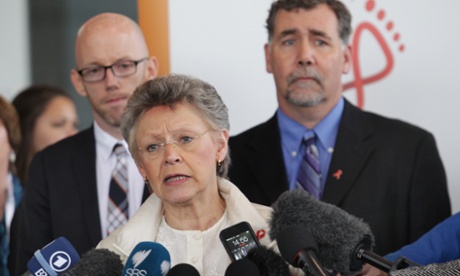Colleagues say the six brilliant minds in the HIV field who died when MH17 was shot down will be remembered and honoured

As hundreds of delegates filed into the Melbourne Convention Centre on Sunday ahead of the official opening of the largest Aids conference in the world, some of the most brilliant minds in the HIV field were missing.
Red HIV ribbons adorned the doors of buildings throughout the precinct and people wore them on their shirts, symbols of the conference taking place but also a sign of remembrance for the six researchers and advocates bound for the conference who were killed on Malaysian Airlines flight MH17.
The International Aids Society confirmed on Saturday night the names of those killed when their plane was shot down over eastern Ukraine: the former society president and professor of medicine, Joep Lange; his partner and Amsterdam Institute for Global Health and Development public health official, Jacqueline van Tongeren; Aids lobbyists, Pim de Kuijer and Martine de Schutter; director of support at the Female Health Company, Lucie van Mens; and World Health Organisation media coordinator, Glenn Thomas.
A number of high profile HIV researchers, including conference co-chair and infectious diseases physician, Professor Sharon Lewin, will pay their respects at the opening ceremony on Sunday night to those killed. There will be one minute’s silence.
As delegates arrived, Lewin said all those killed were due to play a key role in the conference, whether through presenting research or sharing their stories.
“Those on MH17 all worked so hard in the science and community response to HIV – losing all six of them is a major loss,” Lewin said.
Lange, the scientific director of the Amsterdam Institute for Global Health and Development, was much beloved by the HIV research community in Australia. He had worked closely with the Kirby Institute for infection and immunity at the University of NSW.
“Lange’s greatest vision was how to get antiretroviral therapy to low-income countries,” Lewin said. “In 2000, we thought that was impossible, and by 2013 we have 13 million people with HIV on treatment,” Lewin said.
“It was through Lange’s vision and determination, along with that of many others, that this became possible.
“Lange would have spoken about how antiretrovirals are only part of the work in combating HIV, and how that alone is not enough, and he would have been talking about global health, tuberculosis co-infections, and planning new studies with other people present at the conference because this is where a lot of new work starts.”
When the opening ceremony begins, the International Aids Society president, Francoise Barre-Sinoussi, will dedicate the conference to those who were killed. And the Dutch ambassador for HIV/Aids, Lambert Grijns, will read a letter out on behalf of the Netherlands in tribute.
Director of the Dutch HIV support organisation Aids Fonds, Ton Coenen, was emotional as he spoke to Guardian Australia and described his colleagues, de Schutter and de Kuijer, as “beloved”.
“Our colleagues were inspiring and beautiful people who we will forever embrace in our hearts,” Coenen said. “We are saddened not just by the loss of colleagues but by all of those killed. Lucie [van Mens] worked on the development of the female condom, highly crucial because that doesn’t get much attention. And Lange … what can I say? He was crucial to combating HIV.
“There is a big gap left behind, but we are here because they would have wanted us to go on and keep up this fight.”
Coenen said his peers at the conference were devastated and the mood so far had been sombre.
“Everyone is devastated, of course, and it’s not just an accident – it’s a direct killing, it’s murder, which makes it even more gruesome,” he said.
“All of these people killed had international networks, so it’s not just our grief, it’s also their grief.”
Coenen said he hoped the conference would help him to grieve and share the work of his peers.
“There was a special moment at the pre-conference yesterday morning where 500 people in the room held a minute’s silence led by UNAIDS executive director Michel Sidibé, who remembered each of those killed individually.
“That was beautiful, and so important to us in grieving.”
A friend and colleague of Thomas’s at the WHO, Chris Bailey, was not at the conference but said he was devastated by the loss.
“He was such a dedicated professional, and was particularly interested in HIV, tuberculosis and other diseases affecting the developing world,” Bailey said by phone.
“For him, it was more than a job – it was an honour to be working with some of the most vulnerable parts of society.”
Thomas had been living with his boyfriend of many years, who Bailey said was “absolutely devastated right now”.
A candlelight vigil to be held in the city’s Federation Square on Tuesday evening will take on a new meaning, serving as a remembrance for those on MH17, as well as a welcoming for conference guests and an acknowledgment to those living with and who have died as a result of HIV and AIDS.
Flags on government buildings across Victoria are flying at half-mast and will do so until the conference ends on Friday night.
